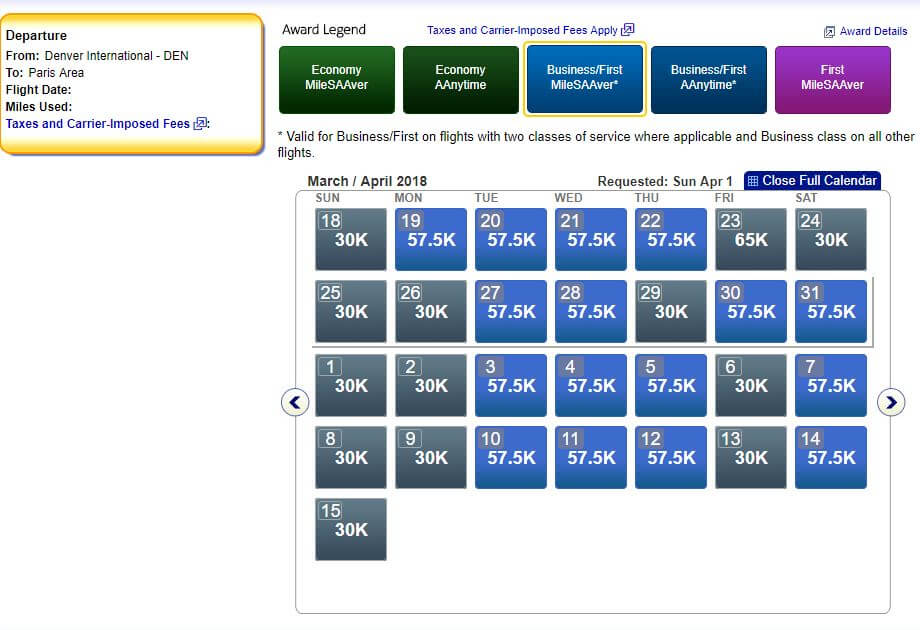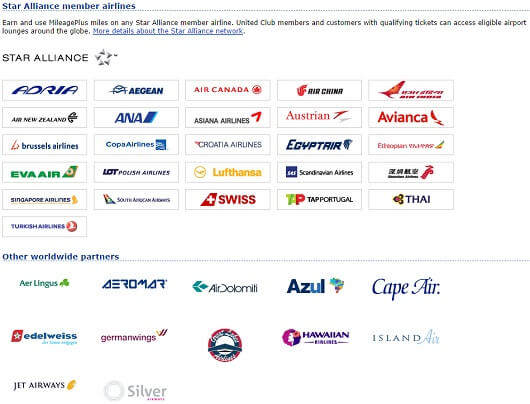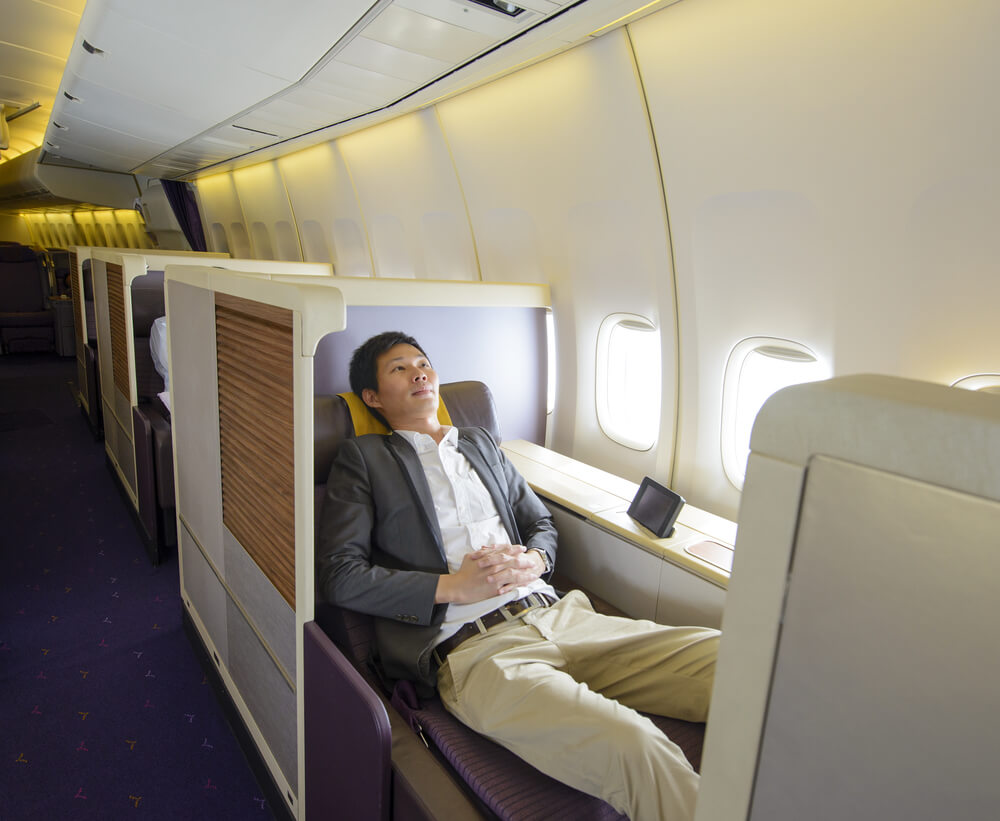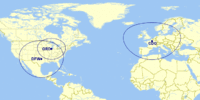Award Tickets 101: The Basics
Frequent flyer miles are one of the cornerstones of savvy travelling. They let you stretch your travel budget further, visit more far flung destinations, and (potentially) avoid sky high prices for last minute travel.
Almost everyone can easily earn large amounts of frequent flyer miles through credit card spending and signup offers, and then redeem those miles for free airplane tickets to anywhere in the world. A typical credit card signup bonus is enough for two round trip flights within the United States or a single round trip to Europe or Japan.
You can redeem smaller numbers of miles for economy class seats; or redeem larger numbers to take advantage of the comfort of lie-flat business seats on long-haul flights. You can even use them to get free tickets for some of the world’s most luxurious first-class flying experiences, which would normally cost thousands, or even tens-of-thousands of dollars., to purchase normally. In conjunction with free hotel nights, frequent flyer tickets can let you travel the world for next to nothing.
This guide provides some general background information about frequent flyer programs. If you already understand the basics of how these programs work, view our step-by-step guide for our best advice and tips on finding award availability and booking frequent flyer tickets.
Jump to
- Only a limited number of seats are available for frequent flyer tickets
- Each type of frequent flyer mile can be used with many different airlines
- Frequent flyer tickets are never truly "free"
- Each frequent flyer program has their own award chart
- Credit cards are the shortcut for earning enough miles for free tickets
- The value you can get for your frequent flyer miles varies wildly
- Use points, like cash, to pay for any flight
- Additional award ticket basics
Jump to:
- 1 Only a limited number of seats are available for frequent flyer tickets
- 2 Each type of frequent flyer mile can be used with many different airlines
- 3 Frequent flyer tickets are never truly "free"
- 4 Each frequent flyer program has their own award chart
- 5 Credit cards are the shortcut for earning enough miles for free tickets
- 6 The value you can get for your frequent flyer miles varies wildly
- 7 Credit card points can still be used to book flights that don't have available award space
- 8 Additional award ticket basics
Only a limited number of seats are available for frequent flyer tickets
While it is actually pretty easy to accumulate a lot of frequent flyer miles, it often takes a lot of effort and luck to be able to get good value from the points you earn.
- Airlines only make a small percentage of their seats available for award tickets. Unfortunately, you can’t use your frequent flyer miles to book tickets on every flight—at least not at regular (“saver”) rates. For some flights, the airline may have never made any frequent flyer space available. For other flights, whatever space was made available has already been booked by someone else.
- Whenever you want to use your points, you'll need to find flights that have available award space. Sometimes, it will be easy to find availability. Other times, it might take a lot of work to find available seats. You may need to shift your dates around, take a less desirable flight or routing, or settle on only using frequent flyer tickets for part of your trip. If you don't have a lot of flexibility, you may simply not be able to find any award availability for any given trip.
- Searching for award availability can be complicated. There is no single website that lets you search for award availability on every airline, although there is a pay-to-use website ($10 for 5 days, $30 per month) that does a pretty good job. You'll typically need to search a number of different websites. To find space, you may need to search a variety of different dates and sometimes airports. For some airlines, you may not be able to check online, and will need to talk to someone on the phone. And, you may need to piece together your own itinerary, by searching for award space on one flight at a time. Check out our Step-by-Step Guide to Booking Award Tickets, for more guidance on finding and booking frequent flyer tickets.
- If you want to use frequent flyer tickets, you may need to take inconvenient flights. In many cases, you won't find award space on nonstop routes, convenient departure times, or popular travel days. With a quick glance at the award availability calendar, it may look like there is plenty of space available. But, when you look closer, you may find that all the options require you to to make extra stops, fly on a red-eye, leave at the crack of dawn, or shift your plans by a few days in either direction.
- With many airlines, you can pay extra miles to book frequent flyer tickets on flights that don't have any regular award seats left—but we usually don't recommend it. These are usually called something like "Anytime awards", and let you use your points for almost every flight. However, we don't usually recommend taking advantage of this option. The airline requires so many extra points, that you are usually better off paying for the flight, and holding onto the points to use for future flights. For example, rather than using twice as many American Airlines miles to book a flight that doesn't have any regular award space left, you are usually better off holding onto your miles for two free airline tickets at some later time.
- Airlines sometimes make new award seats available for a flight, so it can be worthwhile to keep checking. As they see how the tickets are selling for a flight, the airline may make additional award space available. Or someone might cancel an award ticket, which often makes the seat available for someone else. For business, and especially first-class tickets, the airline may not make space available until shortly before the travel dates.
Each type of frequent flyer mile can be used with many different airlines
- You can use each program's frequent flyer miles to book tickets on any of their partner airlines. Almost every frequent flyer program has a set of partner airlines, which you can use for earning and redeeming miles. For example, you don't need to use your United miles to book flights on United. You can use them for frequent flyer tickets on Air China, Asiana, ANA, Lufthansa, Singapore, or any of a couple of dozen other airlines, instead.
- Most of the major airlines belong to one of the three key airline alliances. United is a member of Star Alliance, Delta is a member of SkyTeam, and American is a member of Oneworld. In addition, Alaska Airlines has its own set of very useful partners. You can use miles from any airline in the alliance to book award tickets on any other airline in the alliance, or even tickets that combine flights on multiple airlines. For example, let’s say you want to fly to Bangkok. You could fly United Airlines to Chicago, ANA (All Nippon Airways) from Chicago to Tokyo, and then Thai Airways from Tokyo to Bangkok on a single one-way award ticket, because each of these airlines are part of the Star Alliance. But, you couldn’t substitute American Airlines for the Chicago leg, because they are part of a different Alliance.
- Every type of point and frequent flyer mile, even those from foreign airlines, is valuable. Since each type of frequent flyer miles can be used to book tickets on a number of different "partner" airlines, there are always multiple options for using your points. You can use miles from a program that you may never fly, such as Avianca, to book tickets on the airlines you want to fly, like United. As you start collecting frequent flyer points, don't forget that foreign-airline frequent flyer programs can be just as valuable, or even more valuable, than American's, Delta's, and United's.
- Generally, if award seats are available on an airline, you can book them through any of their partner's frequent flyer programs. For example, if a Japanese Airline (JAL) flight still has award seats available, you should be able to book them using miles from any of their partner airlines. Because they are part of Oneworld, you could use miles from any Oneworld program, such as American Airlines or British Airways. Or you could use miles from any other of JAL's other partners, like Alaska Airlines. Similarly, the same award availability should show up, regardless of which partner website you search.
- However, there are some exceptions:
- You can only use a partner program to book regular ("saver") award seats. You CAN'T use them to book "Anytime" awards (that require additional miles). For example, if American Airlines still has regular ("saver") priced awards to Hawaii, you can book them with British Airways miles. But, if they only offer more expensive AAnytime Awards, you can only book them with American Airlines' own miles.
- Some airlines make some extra award space available to their own members. For example, United makes some extra award space available to United elites and people who have the United credit card. This award space won't show up when you search on partner websites, won't show up if you search on United without being signed-in, and can only be booked with United miles.
- The are frequently special rules for true first class award seats. Many airlines, such as Singapore and Air France, won't allow their first class seats to be booked with partner programs. Many programs, such as Delta, generally won't let you book first class seats on any of their partner airlines. Other programs, like Lufthansa, will only allow you to use partner programs once it gets very close to the departure dates.
When you purchase tickets on an airline, you can earn miles with your choice of any of the programs in the alliance, and any “elite status” that you earn with a specific airline provides some benefits when you fly any of the alliance's other airlines. Understanding Airline Alliances.
Frequent flyer tickets are never truly "free"
- You will always be responsible for paying at least some money in taxes and fees. Fees can range from around $5.60 for a typical domestic ticket, to over $1,000 on some business and first class award tickets to Europe. A frequent flyer program may also add additional fees such as a close-in booking fee, if you are booking within a few weeks of your departure date; or a phone booking fee, if you don't make the reservation online.
- In many cases, you'll need to pay exorbitant fuel surcharges. Depending on where you are flying, many airlines will require you to pay "fuel surcharges" (sometimes called a "carrier imposed surcharges"). There are no fuel surcharges for flights within and between North and South America, and the worst surcharges are for flights to Europe. With the worst offenders, the fuel surcharges on an award ticket can be close to, or more than, the cost of simply buying a regular ticket, giving you little or no value from your points. For example, here is the surcharge associated with a basic economy class award ticket on British Airways:
- You can avoid fuel surcharges by flying on certain airlines or using certain frequent flyer programs. Some airlines, primarily those from the US and South America, don't charge fuel surcharges on their award tickets, regardless of where you are flying, and which types of points you are using. If you need to fly on an airline that DOES charge fuel surcharges, like Lufthansa, you can sometimes avoid them by using certain frequent flyer programs that won't pass the surcharges on to you. For example, when you use United miles to book an award ticket, you'll never pay fuel surcharges, regardless of which airline you fly. Avoid Fuel Surcharges on Award Travel.
Each frequent flyer program has their own award chart
The number of miles you need for a frequent flyer ticket is determined by the frequent flyer program's award chart, not by the airline you are flying.
- Each frequent flyer program requires a different number of miles for the same flight. For example, Delta requires 45,000 points for a round trip ticket to Hawaii. But, Korean Airlines only requires 25,000 points, for the exact same flights. The number of miles required depends on the PROGRAM you are using, not on the AIRLINE you are flying.
- You can take advantage of whichever program requires the fewest number of miles for your flights. As described more fully below, if you are collecting points from credit cards, you'll usually have the option to take advantage of many different frequent flyer programs. Since flights on each airline can be booked with multiple programs, you can choose the program (that you have access to) which requires the smallest amount of points and fees. There are several resources that can help you choose which program to use. Step-by-Step Guide to Booking Award Tickets.
- Award costs are usually based on the regions you are flying between. Most airlines have region-based award charts. All frequent flyer tickets to and from the same regions require the same number of points, regardless of the particular cities you are flying between. For example, all flights within the United States may require 25,000 points, and all flights between the United States and Europe may require 50,000 points.
- One-way awards are usually available for half the cost of round trip awards. Most region-based programs let you use your points for one-way awards. And, based on award space, you may need to use one program to get to your destination, and another program to get home. But, a few programs charge a premium for one-way tickets, or require you to always book a round trip.
- Some frequent flyer program's charge based on distance, rather than by region. With these programs, most notably British Airways, the award cost is determined by how far you are travelling. It doesn't cost any extra points to cross a region boundary, and the costs depend on the exact cities that you are flying between. Distance-based award charts are divided into tiers, so all flights within a range of distances, require the same number of points.
- A few frequent flyer programs base the award cost on the cash price of the ticket, and let you use your points for any seat. The most important examples are Southwest and JetBlue. Rather than having a fixed award cost for a flight between two cities (based on region or distance), these programs base the required number of miles on the price of a ticket. Because the airline is always giving you approximately the same value for each of your points, they don't care which flights you can use them on. The more expensive the ticket is, the more points you'll need to use. You don't have to worry about award availability or not getting enough value from your points; but, you'll never have an opportunity to get out-sized value from particularly good award redemptions.
| Zone | Flight Distance (miles) | Economy | Premium Economy | Business | First |
|---|---|---|---|---|---|
| 1 | up to 650 non-US |
6,000 | 9,000 | 12,500 | 24,000 |
| up to 650 to/from US |
7,500 | 11,250 | 15,000 | 30,000 | |
| 2 | 651 - 1,150 | 9,000 | 12,500 | 16,500 | 33,000 |
| 651 - 1,150 AA and Alaska |
7,500 | 13,500 | 18,000 | ||
| 3 | 1,151 - 2,000 | 11,000 | 16,500 | 22,000 | 44,000 |
| 4 | 2,001 - 3,000 | 13,000 | 25,750 | 38,750 | 51,000 |
| 5 | 3,001 - 4,000 | 20,750 | 41,250 | 62,000 | 82,500 |
| 6 | 4,001 - 5,500 | 25,750 | 51,500 | 77,250 | 103,000 |
| 7 | 5.501 - 6,500 | 31,000 | 62,000 | 92,750 | 123,750 |
| 8 | 6,501 - 7,000 | 36,250 | 72,250 | 108,250 | 144,250 |
| 9 | more than 7,000 | 51,500 | 103,000 | 154,500 | 206,000 |
Distance-based programs are often much cheaper than other programs, particularity for flights that are shorter than the average flights between regions, such as flights from the West coast to Hawaii, flights from Miami to the Caribbean, flights from the East coast to Europe, or short-distance flights within any single region. Fly Short Distances Using Fewer Miles by Taking Advantage of Distance-Based Frequent Flyer Programs.
Credit cards are the shortcut for earning enough miles for free tickets
Frequent flyer tickets require a lot of points, which normally requires a lot of flying. Perhaps you are lucky enough to fly frequently for work, and can easily build up large quantities of frequent flyer miles that you can use for your personal trips. But, if even if you don’t fly frequently, you can still easily earn enough points for frequent flyer tickets—by taking advantage of the generous rewards you can earn from credit cards.
- For most people, credit cards are the key to earning enough points to take advantage of frequent flyer tickets. When you sign up for a travel or rewards credit card, and meet the initial spending requirement, the credit card company will give you large quantities of reward points. For example, a typical signup bonus is 50,000 points, enough for two free tickets within the US or a single free ticket to Europe or Japan.
- As long as you can responsibly handle credit cards, you can easily earn signup bonus after signup bonus (and consequently free airline ticket after free airplane ticket), without hurting your credit rating. Its surprising how many credit cards you can get approved for and how many points you can earn. You can earn even more points, by using these cards for as much of your spending as possible. Much more information and advice on how to easily earn massive amounts of points is available in our Credit Cards 101 guide.
- Many of the most interesting credit cards let you earn points that can be converted into frequent flyer miles with many different frequent flyer programs. The most important of these are Chase’s Ultimate Rewards, Amex’s Membership Rewards, and Citibank’s ThankYou Rewards cards.
- Since you can convert “transferable” credit card points to many different types of frequent flyer miles, and you can redeem each of those types of miles on many different partner airlines, your credit card points can each be used to book frequent flyer tickets on over 100 different airlines.
- Because you can use them with multiple frequent flyer programs, “transferable” credit card points are usually more valuable than miles you earn directly with a frequent flyer program—and are the best place to start focusing your travel rewards efforts. As discussed above, Ultimate Rewards, Membership Rewards, and ThankYou Rewards points let you take advantage of award availability on over a hundred different airlines, and let you take advantage of “sweet spots” in each program (where you can get tickets for fewer than the normal number of miles). Transferable Credit Card Points are Usually Better than Regular Airline Miles.
- Whenever you fly, you should always try to earn miles for your trip. While the bulk of the points you earn are likely to come from credit cards, you should always earn points from your flying as well. It doesn’t take much effort to sign up for a frequent flyer program. And for most flights, you can choose to earn miles with your choice of several different frequent flyer programs, letting you concentrate all your miles into a small number of different accounts. Even if you are unlikely to fly enough to accumulate enough miles to take advantage of a free ticket, you can combine the miles you earn from flying with miles you get from your credit card points, or you can redeem smaller number of miles for gift cards or other valuable options. In short, don't avoid the small amount of effort it takes to be rewarded for every airline flight you purchase. Earn Miles for Every Flight (In as Few Accounts as Possible).
The points you earn from signing up for (and spending with) these cards can be converted into points with many different frequent flyer programs. For example, the 50,000 points you earn from signing up for one of Chase’s Sapphire cards can be converted into 50,000 miles with your choice of United Airlines, Southwest Airlines, or any of several other frequent flyer partners. Amex’s Membership Rewards points can be turned into around two dozen different types of frequent flyer miles.
Unlike some other credit cards, you don't have to use these points, at a fixed value per point, to purchase airline tickets from a travel website. Instead, you are transferring them directly to the airline’s frequent flyer program. Then you can use them, like any other frequent flyer miles, to book award tickets.
For example, rather than concentrating on earning Delta miles with Delta’ credit cards, you can focus on earning Amex's Membership Rewards points.. If you want, those Membership Rewards points can then be converted into Delta miles, on a one to one basis; but they also have the flexibility to be transferred to many other airline programs, should the need arise.
The value you can get for your frequent flyer miles varies wildly
- Because the number of miles you need for frequent flyer tickets doesn't usually depend on the actual price of the tickets, you can get amazing value from your points when you use them for tickets that are more expensive than usual, and you'll get less value when you use them for tickets that are less expensive than usual. For example, if you use 25,000 Korean Airline points to book a ticket to Hawaii, which would normally cost $750, you're getting 3 cents in value for each point. But, if you use 50,000 points to fly to Europe, when tickets are available for only $500, you are only getting 1 cent in value per point.
- Even when you can get a frequent flyer ticket, it may not always be a good use of your points. Regular airfares have been dropping dramatically, especially internationally. Often, when ticket prices are expensive, frequent flyer tickets are not available; and when prices are cheap, you aren’t getting much value from your points. Unless you are earning more points than you’ll ever need, if award costs are high relative to the cash ticket prices, it makes sense to save your points for later.
- In general, we usually hold onto our points unless we can get at least 1.2 - 1.75 cents in value per point. For example, we would only use 40,000 Membership Reward points, if it saved us at least $600 on the cost of a ticket. If you find yourself with plenty of opportunity to use your points, you’ll want to look for even better value per point. If you can never find good opportunities, you should start using them even when you are getting less value per point. We would never use flexible points for frequent flyer tickets unless the value is better than their easy-to-redeem options. For example, we would never use Ultimate Reward points for less than 1.5 or 1.75 cents per point, because you can get that value by simply using them to purchase tickets or book Hyatt hotel rooms. Our bar for airline-specific miles is usually closer to 1.2 cents per mile.
- If you highly value business and first class tickets, frequent flyer miles are incredibly valuable—and it’s almost always a good idea to use your points when you can. It usually costs around twice as many points to book business class frequent flyer tickets, rather than coach tickets. But, cash prices for business class tickets are usually much more expensive. For example, it is a good deal to use 45,000 miles, instead of $700, to buy a round trip economy tickets to Paris. But, it is a much better deal to use 80,000 miles, instead of $3,500, to buy a business class ticket instead. With the economy ticket, you are getting 1.6 cents per point; with the business class ticket, you are getting 4.4 cents per point. Book the Most Spectacular First-Class Experiences with Your Miles.
Of course, this depends on how much you truly value the business class seat. If you would have paid the regular asking price for the business class tickets, using a frequent flyer ticket is a fantastic deal—you’re typically saving thousands of dollars. If you would have only paid a few hundred dollars extra for the better seats, you are probably better off sticking to economy class award tickets, and spreading your points across more trips. Ask yourself whether you'd rather have twice as many free tickets in economy or half as many in business. However, some people, who would never pay cash for a business or first class seat, relish the opportunity to get them for free, even if it requires large numbers of points.
Credit card points can still be used to book flights that don't have available award space
As discussed above, sometimes you won’t be able to find any award availability for your trip, or the award space you can find may be too expensive or inconvenient. Alternatively, flights may be inexpensive enough, that it simply makes sense to save your valuable points for future redemptions. In these cases, you would generally just pay cash for the ticket (and earn some additional frequent flyer points to use on later flights). However, there is also another option.
You can use many types of credit card points, instead of cash, to purchase any airline ticket.
You don’t need to find award space, and there is no set number of points you need for your route. Instead, your points just have a fixed cash value. Depending on what credit card you have, you an purchase any ticket by using Chase’s Ultimate Rewards points at up to 1.5 cents each or Amex’s Membership Rewards points at up to 1.54 cents each. For example, if you wanted to buy a $400 airline ticket, you could use about 27,000 points instead, without needing to worry about award availability.
Each of the major "transferable" point currencies can be used in this way (along with being able to be converted into frequent flyer miles).
Assuming you gradually acquire more and more credit cards to take advantage of their signup bonuses, you’ll eventually decide to sign up for credit cards, such as the Barclays Arrival Plus card, which earn points that can only be used in this way. The points from these credit cards CAN'T be converted into frequent flyer miles to book award tickets, but they can be used to offset the cost of cash tickets that you purchase. Pay for Any Ticket Using Credit Card Points, Regardless of Award Availability.
Additional award ticket basics
- You can usually use your points to book award tickets for other family members. Some programs will let you use your points to book awards for anyone you know, others limit you to people you put on a list or to only immediate family members.
- With many programs, you can visit two locations for the same price as one. Many frequent flyer programs allow free "stopovers". You can fly to one location, then fly to a second location, and then fly back home, for the same number of miles as a regular round trip. This can be a great way to get additional value from your points. Use Free Stopovers to Visit Two (or More) Places for the Price of One.
- Points with most airline programs will expire if the account becomes inactive. Usually you need to earn or spend some points every 12 to 24 months, or the airline may take away your point balance. Fortunately, there are some easy ways to generate activity to keep your points alive. With a few programs, your points will expire after 2 to 5 years, regardless of activity. Points with credit card programs won’t expire as long as you have one of their cards. Keep Your Points from Expiring.
- You can start booking award tickets a little less than a year ahead-of-time—sometimes this is the easiest time to find award space. When the airline first loads their flights into the reservation system, they will usually make a certain amount of award space available on many routes. If you already know when and where you want to travel, this can often be the easiest time to find available award space.















